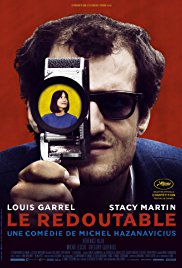Redoutable [Le Redoutable] **** (2017, Louis Garrel, Stacy Martin, Bérénice Bejo, Micha Lescot, Grégory Gadebois, Guido Caprino) – Movie Review
Louis Garrel gives a remarkable star turn as French film director Jean-Luc Godard, taking on his look, voice and his personality. It is an impressive tour de force. He keeps his version of Godard on the side of being an infuriating but sympathetic, sacred monster, attacking him while simultaneously adding to the great man’s allure, stature and legend.
In writer-director Michel Hazanavicius’s narrative, Godard falls in love with the extremely cute 17-year old actress Anne Wiazemsky, writer François Mauriac’s granddaughter, and later marries her on 22 July 1967. Stacy Martin plays Wiazemsky most alluringly. Wiazemsky is portrayed as sweet, obedient and passive, totally in awe of the great maestro, a svengali, daddy figure.
Hazanavicius’s provocative, thought-provoking and intelligent screenplay is based on Anne Wiazemsky’s autobiography Un an après, so the account may be a bit one-sided, though the couple’s story could have been exactly like this. Godard emerges here as one horrible human being, impossible to have a successful relationship with for very long, soon falling out with everybody, thinking he can safely insult someone one day then apologise and be friends the next. He is a narcissist. Redoutable is a bit of an upper-range soap opera, but it is also a classy film of ideas, and a film about films and filming. It is irresistible.
It is Paris, 1967, and Godard is making Maoist political tract La Chinoise, starring his girlfriend Wiazemsky, who is 16 years younger than Anne. She falls headlong for Godard’s wit, intelligence, fame and style, while he loves Anne’s youth, beauty and the way she looks up to him and hangs on his every, often clever, sometimes silly, word.
For a while it is paradise. But then the Paris revolt of May 1968 tests their marriage as Godard obsesses with the idea of revolution, partly shuts himself off emotionally and physically from his new wife, while being insanely jealous when she even talks to other men. Eventually, Wiazemsky wants to work on another director’s film (it’s an Italian film by Marco Ferreri) rather than accompanying Godard like a sheep. Godard hits back angrily, in a passive aggressive way. Ferreri is keeping his film fun on set. It is a recipe for disaster.
It proves a very good story, and it is well told by Hazanavicius, who has no strain in summoning up the period, the attitudes, and the ideas, while making a satisfying drama of love turning sour. It is a sad story, it’s true, but then a song of love is a song of woes… It turns out Godard hates romantic films, and story films, and more or less anything films actually.
He despises Jean Renoir, Alfred Hitchcock and John Ford, but has time for Jerry Lewis and the Marx Brothers! Well, he is an agent provocateur, and that is good, but also here he is shown as a pain in the ass, which is not at all good, but Garel ensures he is a thoroughly entertaining pain in the ass. And Hazanavicius ensures this is a thoroughly entertaining movie.
It is hardly surprising that Godard called the film a ‘stupid, stupid idea.’ Godard is the maker of A bout de souffle [Breathless] (1960), My Life to Live (1962), Le Mépris [Contempt](1963), Alphaville (1965), Pierrot le Fou (1965), Masculin Féminin (1966), Two or Three Things I Know About Her… (1967), La Chinoise (1967) and Weekend (1967).
Wild Bunch boss Vincent Maraval started a backlash after allegedly homophobic tweeting over the choice of Robin Campillo’s AIDS activism drama 120 BPM (Beats per Minute) to represent France in the Best Foreign Language Film Oscar category. Maraval had backed Redoutable, which had been shortlisted by France’s Oscar committee and is being sold by Wild Bunch. However, it is comes to a choice, we could just say Redoutable is an excellent film and 120 BPM (Beats per Minute) is a great one.
Anne Wiazemsky died of breast cancer on 5 October 2017, aged 70. She was also known for Au Hasard Balthazar (1966) and Teorema (1968).
© Derek Winnert 2017 Movie Review
Check out more reviews on http://derekwinnert.com




